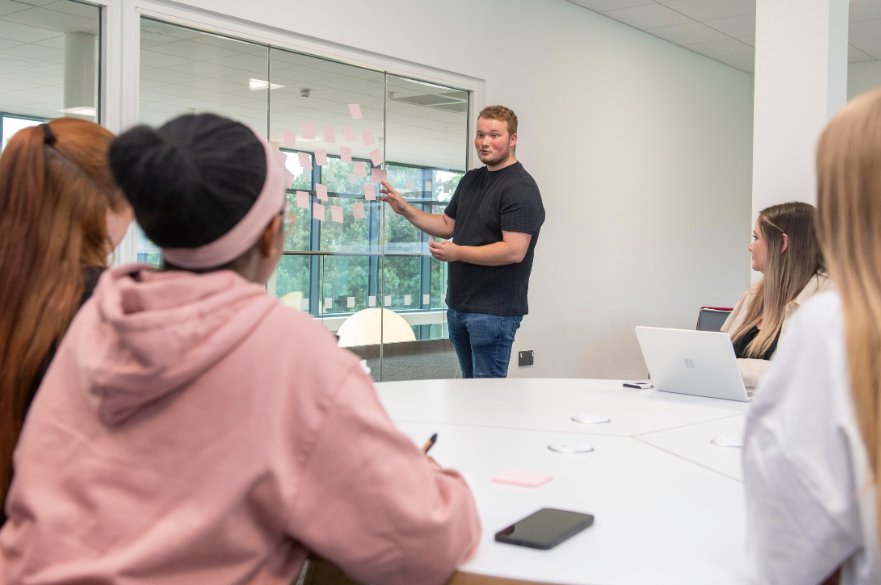Beat the Clearing queue
About this course
Social work is about making a real difference. It takes compassion, determination, and a strong mind.
What do social workers do? We step in wherever there’s a need—whether it's protecting children, supporting vulnerable adults, or helping with mental health and the cost of living. We tackle big issues like inequality, discrimination, and poverty, making an impact every day. We help individuals, families, and communities, leaving a lasting mark on their lives.
While the work can be challenging, it’s incredibly rewarding. Social work is more than a job, it’s a calling. Studying this social work degree at NTU Mansfield, you’ll cover real-life issues and develop the skills and knowledge to be a professional social worker. Get ready to be challenged, to develop yourself, and make a real impact on society.
Visit us
Book your place on our upcoming BA (Hons) Social Work degree launch event on Wednesday 9 July, 3 – 5 pm. This is your opportunity to discover the course, explore our facilities, meet the team and connect with others passionate about social justice.
This course is pending approval from Social Work England.
We also offer the BA (Hons) Social Work course at our City Campus.
Why study this course?
-
Experience the real world of social work, with 170 days of practice placements included as standard.
-
Join a wider family — our industry connections and opportunities stretch right across the Midlands.
-
By undertaking this course in Mansfield, you could be sponsored by Nottinghamshire County Council during your studies.
What you’ll study
Studying this course, you’ll get input from a wide range of perspectives—students, lecturers, social work partners, and employers. You’ll graduate with a deep understanding of current practice.
Together, we’ll explore important topics that other degrees might miss, like the impact of digital tools in social work, from online assessments to communicating with service users through text and WhatsApp. Through discussion and reflection, you’ll challenge your own ideas and develop new perspectives. You’ll learn to understand human behaviour, explore responses to trauma and loss, and rethink your views on family and society. You’ll also complete professional placements, gaining experience with key issues like ‘need’ and ‘risk’, and how they’re managed.
This course isn’t just about becoming a social worker; it’s about using your own strength, emotional intelligence, and commitment to making a difference for change. Here’s a full breakdown of the modules you’ll study.
Core modules
Preparing for Professional Social Work Practice (40 Credit Points)
This module aims to equip you with the skills and capabilities in preparation for the assessed placement in Year Two. The module includes 30 practice skill days, which are assessed; culminating in a readiness-to-practise interview and a portfolio of evidence to reflect the skills acquired. Reflective practice, social work values, and interpersonal and communication skills feature highly in this module.
Theories, Models, and Approaches in Social Work Practice (40 Credit Points)
This module provides you with a comprehensive understanding and knowledge of the specific theories relevant to social work and your application to practice. Social work models and approaches are also explored in the module. Module content supports you to develop skills in practice hypothesis formulation and support understanding of how social workers can effectively assess service user needs and deliver effective interventions. The module will support your professional development and help you to prepare you for learning in practice from Year 2.
Life Course Development in Social Context (40 Credit Points)
This module will introduce you to the nature and principal features of human development in contemporary social, material, and political contexts. There will be a strong emphasis on the bio-psycho-social features of child development and early family life as the foundation for later trajectories. A life-span development framework will be used throughout, representing human growth and development as the interplay of biological, psychological, social and historical factors, to explain unfolding events in the individual life course.
Core modules
Practice Placement (One) (40 Credit Points)
You'll complete an 80-day placement, and will carry responsibility for a range of work in order to demonstrate meeting the required learning outcomes according to the Professional Capabilities Framework and Knowledge and Skills Statements. A Practice Educator will provide supervision and support, and will assess you during your placement. You will also receive support from your personal tutor.
Engaging with Professional Social Work Practice (20 Credit Points)
Building upon the knowledge and skills you will have acquired in Year One, you will develop your ability to adopt an enquiring and analytical approach to knowledge in social work, and build the skills for systematic enquiry and critical thinking in practice. You will also build your personal skills and aptitude to engage within practice settings, and meet the personal challenges these present.
Legal and Statutory Responsibilities (40 Credit Points)
You will be equipped with the knowledge to know when statutory powers and duties should be used to prevent, or protect people from, harm; and how legislation can help ensure entitlements are met and rights promoted. Students will be taught to be confident and skilful in order to make complex decisions informed by the social work principles of equality, human rights and social justice.
Social Policy (20 Credit Points)
You will explore contemporary social issues, welfare provision and socio-economic factors contributing to the social problems encountered by service users and their families. Studying social policy from the perspective of social work practice will enhance your understanding of the impact of social policies on marginalised and excluded groups.
Core modules
Practice Placement (Two) (60 Credit Points)
In Year Three the placement increases to 90 days and must include a focus on statutory tasks. A Practice Educator will provide regular supervision and support to enable professional development and assess your practice according to the Knowledge and Skills Statements and Professional Capabilities Framework. Your personal tutor will also provide you with support.
Safeguarding: Working with Risk and Complexity (20 Credit Points)
A module in which the specialist skills and knowledge required for safeguarding vulnerable children and adults are enhanced and consolidated. Students will explore a range of topics and practice-based scenarios / issues including the assessment and management of risk and working with complexity. The module will support students' professional confidence and equip them with core skills and knowledge to undertake their safeguarding responsibilities as qualified practitioners.
Working with Individuals, Groups and Families (40 Credit Points)
Apply a more in-depth and critical social work perspective, with an emphasis on holistic interventions and systemic thinking. The module will enable you to manage risk and safeguard adults, children and families from abuse and harm. The module links with the final practice placement to provide a context for you to complete a final in-depth project, and will generate expertise in an area that is likely to be valued by potential employers.
We regularly review and update our course content based on student and employer feedback, ensuring that all of our courses remain current and relevant. This may result in changes to module content or module availability in future years.
How you're taught
How will I learn?
Our teaching team has over 170 years’ professional experience in social work. Across the country, from the NSPCC to the Football Association, they’ve worked in fields as varied as mental health, neurodiversity, domestic violence, child protection, learning disabilities, addiction, and the probationary services. You’ll be learning from the best of the best: add in the insights of guest speakers (including our own graduates, who are ready to share their professional success stories), plus your coursemates’ own experiences of ‘the system’, and your journey towards Social Work England registration will be a dynamic, thought-provoking one.
You’ll learn through a mix of:
- lectures, introducing the biggest issues in social work, and exploring the realities of professional practice
- small-group seminars and workshops, designed to improve your teamworking and problem-solving skills
- simulation, building up your interpersonal skills by roleplaying with people who’ve got lived experience of the social work system
- real-world case studies, helping you to understand the people and processes that have resolved high-profile, high-risk situations
- placements in Years Two and Three, where you’ll get to experience different social work environments — from local authorities to the voluntary sector. Where possible, placements will be within Mansfield, Ashfield and the local area provided by Nottinghamshire County Council. Other potential placement providers are Nottingham City Council, Nottinghamshire County Council, Derby City Council, and Derbyshire County Council, and possibly Leicester City Council. It would be advantageous if you have a full driving licence and access to a car.
- field trips, and opportunities to collaborate with students from our international partner universities across Europe
- one-on-one meetings with your friendly personal tutor
- independent study, as you build up your research skills.
How you're assessed
People learn in different ways, and we want everybody to have the best possible chance of success. That’s why we’ve introduced a wide range of assessment methods onto NTU’s Social Work degree course — everything from essays, reports, and presentations to quizzes and interviews. Student’s practical performance in placement learning is also assessed.
- Year 1 coursework, written and practical
- Year 2 coursework, written and practical
- Year 3 coursework, written and practical
Contact hours
Here’s the year-by-year breakdown of how you'll be taught throughout our Social Work degree course:
- Year One — typically students will need to spend two, or three days on site engaging with taught sessions, such as lectures, workshops and tutorials. Approximately 60% of students time will be spent on independent study. Practical skills days are also included in Year One of the course.
- Year Two — students will complete a 80-day assessed practice placement which is full-time. Typically students will need to spend two, or three days on site engaging with taught sessions, after placement is complete. Approximately 60% of students time will be spent on independent study. Practical skills days are also included in Year Two of the course.
- Year Three — students will complete a 90-day assessed practice placement which is full-time. Students will return to site in Term 2 to engage in taught sessions. Typically students will need to spend two, or three days on site engaging with taught sessions, after placement is complete. Approximately 70% of students time will be spent on independent study. Practical skills days are also included in Year Three of the course.
Careers and employability
We don’t keep any secrets about the profession. Becoming a social worker is a challenge, but it’s also a privilege. By understanding from day one the realities of professional practice — the fact that supporting vulnerable and marginalised people can be tough, busy work — you’ll be fully prepared for your next steps. Many courses shy away from those realities, but we feel that our job isn’t just to help you find a great graduate role: it’s to help you stay in it, and then progress. That means keeping the profession’s surprises to a minimum.
Because we’ve developed this course in partnership with major social work employers and statutory bodies, the quality of our graduates is already well-known throughout the UK — and even further afield. In that sense, we’re a great university to be associated with.
Experience the real world of social work, as you study
The embedded placements are a vital part of this course. In addition to 30 skills days which are spread over the three-year course, you’ll complete 170 days of assessed placements across Years Two and Three. It’s not just about bringing your theoretical skills out of the classroom and into the real world; it’s about you finding your best professional fit for life after graduation. That could be anything from a local authority, to a school, to a housing association like Framework. What’s more, the placement process will give you the experience of applying for roles and marketing yourself — a big competitive advantage when it comes to job-hunting.
Where possible, placements will be within Mansfield, Ashfield and the local area provided by Nottinghamshire County Council. Other potential placement providers are Nottingham City Council, Nottinghamshire County Council, Derby City Council, and Derbyshire County Council, and possibly Leicester City Council. It would be advantageous if you have a full driving licence and access to a car.
Sponsored students will be guaranteed employment with Nottinghamshire County Council in Mansfield, Ashfield or Bassetlaw upon successful completion of the training.
Social work jobs and careers
Once you’ve graduated and joined the Social Work England register of professional practitioners, the world’s your oyster! On a planet full of people in need, social work is a genuinely global profession. With the knowledge and transferable skills you’ll cultivate on this course, you could be a prime candidate for roles in everything from hospitals and hospices, to NGOs and Third-Sector organisations, to teaching and training — anywhere from Australia to Canada!
Only recently, our graduates have secured roles as:
- Social Workers, specialising in children and families
- Adult Care Workers
- Community Care Officers
- Mental Health Support Workers, and advocates for Adult Learning Difficulties
- Befrienders
- Refugee Support Workers.
Campus and facilities
As an NTU Mansfield student, you’ll benefit from the latest facilities and modern technology to support your studies and help you get the most out of student life.
We are continually investing in our facilities and enhancing our learning and teaching environment to make it an inspiring place for students.
Facilities and services include:
- University Centre
- Teaching and Learning Centre
- Library
- Dedicated study zones, including PC suites
- On-site café
- Social spaces
- Sports facilities
- Student Support Services
- Nottingham Trent Students Union (NTSU) drop-in events.
Entry requirements
UK students
Standard offer: 120 UCAS Tariff points from three A-levels or equivalent qualifications
Contextual offer: 112 UCAS Tariff points from three A-levels or equivalent qualifications
Other requirements: Attend an interview, GCSE English Language or Literature grade C / 4 or equivalents. Equivalents include Level 2 Literacy/Level 2 Key Skills.
If you are working towards your GCSE English Literature or English Language or equivalent qualification, please ensure you mention this on your application form.
To find out what qualifications have tariff points, please use our tariff calculator.
Additional requirements for UK students
Personal statement
In addition to the entry requirements listed above, you will need to submit a personal statement demonstrating:
- an understanding of the role of a social worker and current social work issues
- an insight into the statutory and regulatory aspects of social work and social work training
- your social care work experience (paid or unpaid), and how this relates to social work
- demonstrate an understanding of the role of a social worker and current social work issues
- demonstrate your ability to communicate effectively, through spoken and written English
- demonstrate in your application your motivation to study and train as a social work practitioner
- provide details of the length of time spent gaining relevant social care experience and the type of social care experience you have –(either paid or voluntary) which specifically demonstrates your suitability to study and train as a social work practitioner.
Other requirements
You will also need to:
- take part in a 2-stage interview process that is inclusive of an online written test, and a panel interview.
- complete an enhanced-level Disclosure and Barring Service check
- provide a satisfactory health declaration
- declare any personal involvement with Children's and / or Adult Services by completing a Character Conduct form
- confirm the ability to use a range of IT facilities including email, internet, and word processing.
There may also be other recommendations, such as a vaccination programme, before any placements can be undertaken.
Interview dates
We welcome early applications from candidates as we are keen to meet you and introduce you to our BA Social Work degree.
Contextual offers
If you don’t quite meet our entry requirements, we might be able to make you a lower offer based on a range of factors, including your background (such as where you live and the school or college you attended), your experiences and your individual circumstances (you may have been in care, for example). This is called a contextual offer, and we get data from UCAS to help make these decisions. We do this because we believe everyone with the potential to succeed at NTU should have the opportunity to do so, no matter what barriers you may face.
Meeting our entry requirements
Hundreds of qualifications in the UK have UCAS Tariff points attached to specific grades, including A-levels, BTECs, T Levels and many more. You can use your grades and points from up to three different qualifications to meet our criteria. Enter your predicted or achieved grades into our Tariff calculator to find out how many points your qualifications are worth.
Other qualifications and experience
NTU welcomes applications from students with non-standard qualifications and learning backgrounds, either for year one entry or for advanced standing beyond the start of a course into year 2 or beyond.
We consider study and/or credit achieved from a similar course at another institution (otherwise known as credit transfer), vocational and professional qualifications, and broader work or life experience.
Our Recognition of Prior Learning and Credit Transfer Policy outlines the process and options available for this route. If you wish to apply via Recognition of Prior Learning, please contact the central Admissions and Enquiries Team who will be able to support you through the process.
Getting in touch
If you need more help or information, get in touch through our enquiry form.
International students
This course is not suitable for Student visa (tier 4) applicants.
Applicants requiring a Student visa (tier 4) should apply for BSc (Hons) Social Work based at our City Campus.
Additional requirements for international students
There are no additional requirements for this course.
English language requirements
View our English language requirements for all courses, including alternative English language tests and country qualifications accepted by the University.
If you need help achieving the language requirements, we offer a Pre-Sessional English for Academic Purposes course on our City campus which is an intensive preparation course for academic study at NTU.
Other qualifications and experience
If you have the right level of qualifications, you may be able to start your Bachelors degree at NTU in year 2 or year 3. This is called ‘advanced standing’ entry and is decided on a case-by case basis after our assessment of your qualifications and experience.
You can view our Recognition of Prior Learning and Credit Transfer Policy which outlines the process and options available, such as recognising experiential learning and credit transfer.
Sign up for emails
Sign up to receive regular emails from the International Office. You'll hear about our news, scholarships and any upcoming events in your country with our expert regional teams.
Getting in touch
If you need advice about studying at NTU as an international student or how to apply, our international webpages are a great place to start. If you have any questions about your study options, your international qualifications, experience, grades or other results, please get in touch through our enquiry form. Our international teams are highly experienced in answering queries from students all over the world.
Policies
We strive to make our admissions procedures as fair and clear as possible. To find out more about how we make offers, visit our admissions policies page.










